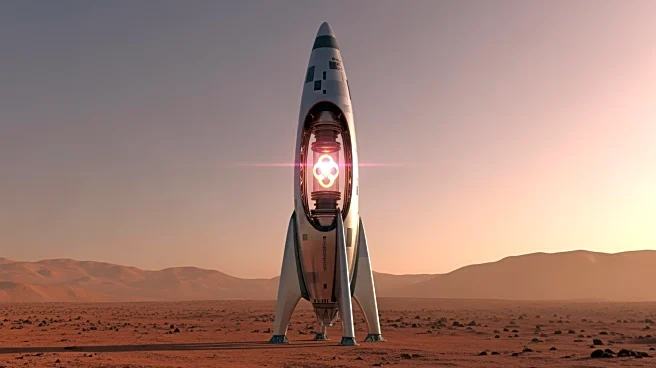What's Happening?
The concept of nuclear rockets is gaining attention as a potential breakthrough in space travel, particularly for missions to Mars. A new design, the centrifugal nuclear thermal rocket (CNTR), is being
developed through a NASA-funded study led by Dean Wang of Ohio State University. This design uses liquid uranium fuel in a rotating cylinder to generate heat and thrust, potentially reducing travel time to Mars from three years to just 420 days. The CNTR could double the efficiency of earlier nuclear thermal designs and quadruple the thrust of chemical rockets, offering a more efficient and faster means of space travel.
Why It's Important?
The development of nuclear propulsion technology could revolutionize space exploration by significantly reducing travel times and increasing the feasibility of long-duration missions. This advancement would enhance the safety and sustainability of missions by minimizing astronauts' exposure to cosmic radiation and other space hazards. The ability to reach Mars and other distant destinations more quickly could accelerate scientific research and exploration, opening new opportunities for discovery and potential colonization. The success of nuclear rockets could also position the U.S. as a leader in space technology, with implications for national security and international collaboration in space exploration.
What's Next?
The CNTR technology is currently in the theoretical design phase, with hopes of achieving engineering readiness within five years. If successful, nuclear-powered spacecraft could become a reality by mid-century, enabling routine missions throughout the solar system. The development process will involve overcoming technical challenges and securing funding and support from government and industry stakeholders. The potential deployment of nuclear rockets will also require addressing regulatory and safety concerns, particularly regarding the use of nuclear materials in space.
Beyond the Headlines
The pursuit of nuclear propulsion raises ethical and environmental considerations, such as the safe handling and disposal of nuclear materials. The potential militarization of space technology is another concern, as advancements in propulsion could have dual-use applications. The cultural and societal impact of faster space travel, including the possibility of human settlement on other planets, will also be significant. These developments could reshape humanity's relationship with space and prompt new discussions about the future of exploration and our place in the universe.










